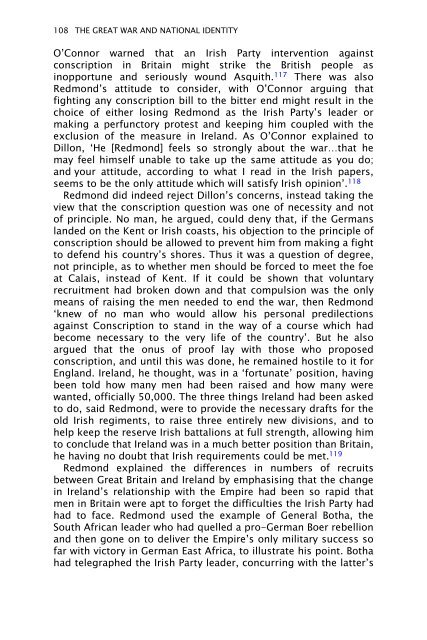Dividing Ireland: World War I and Partition
Dividing Ireland: World War I and Partition
Dividing Ireland: World War I and Partition
You also want an ePaper? Increase the reach of your titles
YUMPU automatically turns print PDFs into web optimized ePapers that Google loves.
108 THE GREAT WAR AND NATIONAL IDENTITY<br />
O’Connor warned that an Irish Party intervention against<br />
conscription in Britain might strike the British people as<br />
inopportune <strong>and</strong> seriously wound Asquith. 117 There was also<br />
Redmond’s attitude to consider, with O’Connor arguing that<br />
fighting any conscription bill to the bitter end might result in the<br />
choice of either losing Redmond as the Irish Party’s leader or<br />
making a perfunctory protest <strong>and</strong> keeping him coupled with the<br />
exclusion of the measure in <strong>Irel<strong>and</strong></strong>. As O’Connor explained to<br />
Dillon, ‘He [Redmond] feels so strongly about the war…that he<br />
may feel himself unable to take up the same attitude as you do;<br />
<strong>and</strong> your attitude, according to what I read in the Irish papers,<br />
seems to be the only attitude which will satisfy Irish opinion’. 118<br />
Redmond did indeed reject Dillon’s concerns, instead taking the<br />
view that the conscription question was one of necessity <strong>and</strong> not<br />
of principle. No man, he argued, could deny that, if the Germans<br />
l<strong>and</strong>ed on the Kent or Irish coasts, his objection to the principle of<br />
conscription should be allowed to prevent him from making a fight<br />
to defend his country’s shores. Thus it was a question of degree,<br />
not principle, as to whether men should be forced to meet the foe<br />
at Calais, instead of Kent. If it could be shown that voluntary<br />
recruitment had broken down <strong>and</strong> that compulsion was the only<br />
means of raising the men needed to end the war, then Redmond<br />
‘knew of no man who would allow his personal predilections<br />
against Conscription to st<strong>and</strong> in the way of a course which had<br />
become necessary to the very life of the country’. But he also<br />
argued that the onus of proof lay with those who proposed<br />
conscription, <strong>and</strong> until this was done, he remained hostile to it for<br />
Engl<strong>and</strong>. <strong>Irel<strong>and</strong></strong>, he thought, was in a ‘fortunate’ position, having<br />
been told how many men had been raised <strong>and</strong> how many were<br />
wanted, officially 50,000. The three things <strong>Irel<strong>and</strong></strong> had been asked<br />
to do, said Redmond, were to provide the necessary drafts for the<br />
old Irish regiments, to raise three entirely new divisions, <strong>and</strong> to<br />
help keep the reserve Irish battalions at full strength, allowing him<br />
to conclude that <strong>Irel<strong>and</strong></strong> was in a much better position than Britain,<br />
he having no doubt that Irish requirements could be met. 119<br />
Redmond explained the differences in numbers of recruits<br />
between Great Britain <strong>and</strong> <strong>Irel<strong>and</strong></strong> by emphasising that the change<br />
in <strong>Irel<strong>and</strong></strong>’s relationship with the Empire had been so rapid that<br />
men in Britain were apt to forget the difficulties the Irish Party had<br />
had to face. Redmond used the example of General Botha, the<br />
South African leader who had quelled a pro-German Boer rebellion<br />
<strong>and</strong> then gone on to deliver the Empire’s only military success so<br />
far with victory in German East Africa, to illustrate his point. Botha<br />
had telegraphed the Irish Party leader, concurring with the latter’s








